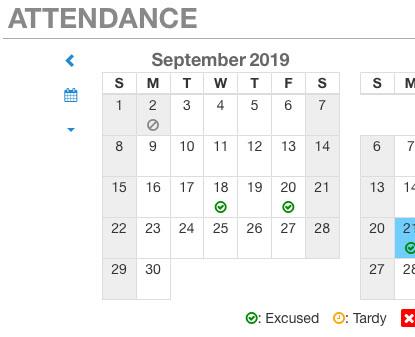
This summer, Governor Kate Brown signed a measure giving students the chance to take an excused mental health day from school. The law was proposed and lobbied for by a group of student activists from across the state of Oregon. Before this school year, students who experienced mental or behavioral health issues would have to lie about their reason for missing school, as PPS and other school districts reserved excused absences for medical appointments, illness, and family emergencies. Many Franklin students are familiar with the process of having to hide the real reason they’re taking time off. “Every time I have missed school for mental health reasons, I have lied and said it was due to an appointment or a cold. Mainly this is because when I miss school I am not allowed to participate in soccer that day unless it is for an appointment, but also because I often don’t feel comfortable letting my peers and teachers know why I am absent,” explains Ruby Swiericzuk (10).
Getting an excused absence to take time for emotional wellness is only half the battle for a lot of teens, as parents and teachers can still serve as barriers for a student getting their needed recuperation time. “I have had some really supportive teachers and school staff throughout the years, who have given me due date extensions and other accommodations I might have needed. I have also had some really judgmental and not trauma-informed staff throughout the years that have denied my mental health challenges because ‘I had good grades’ therefore ‘I didn’t need support.’ In those cases I felt very invalidated and angry,” explains Olive Vigna (11). Hakon Rozell, a senior at Cleveland, hasn’t been able to be open with his parents about taking time off. “My parents won’t let me skip school for mental health. I don’t really think [this law] will change my parents’ mind, but I really hope in the future someone who really needs it will have understanding parents and they’ll feel more successful and understood because of it.”
The stigma surrounding mental illness prevents a lot of teens and adults from seeking the help they need, as their parents and other community members may not see their struggles as a valid issue. Nevertheless, mental illness is very prevalent. Oregon’s suicide rate is 40 percent above the national average, and suicide is the second leading cause of death for people ages 10-34 in the state, making mental and emotional wellness factors that need to be addressed. Lucy Benoit (11), secretary and treasurer of the Franklin Mental Health Advocacy Club, sees this law as a step in the right direction, and says, “Everyone has mental health, and everyone has a different relationship with their mental health. So, when we isolate people who are struggling instead of giving them resources and support, it makes it so much harder for them to get better. I think we have to prioritize mental health because it is involved in all aspects of our lives, and is basically crucial to our functioning on a daily basis.” Rozell, who balances his time between school and cross country, agrees by saying, “If you don’t feel good, a lot of the things you enjoy doing, you may stop enjoying because you just don’t feel good while doing them. If your mental health is taking that away, then it’s just a negative cycle.” Taking time off from the pressures of day to day life can be rejuvenating for students, and allows them to come back to school more focused and ready to achieve than before.
So what’s the next step moving forward? Vigna, who supports teens emotionally through her volunteer work on the Oregon Youthline, encourages teachers and staff members to “check in with the student who has taken a mental health day or is consistently taking them, and asking them if they need additional support.” She concludes by saying, “I hope that students will take this new law and use it to assist them in reaching out for help. I personally feel a lot more validated when I am missing school for the truth rather than telling a lie. Mental health is a real and valid thing that needs to be taken seriously, especially in our youth!” Although some barriers still exist for students to seek the mental health support they need, this law is a step in the right direction, as it is opening up a discussion and giving teens validation to practice self-care.
If you or someone you know is struggling with their mental health, here are some resources in our community. School Social Worker: Jed McClean, [email protected] Oregon Youthline: a confidential peer-to-peer support line. Call 877-968-8491 or text teen2teen to 839863. Bridge City Counseling: Low fee counselors available. 712 SE Hawthorne Blvd Suite 100.

































